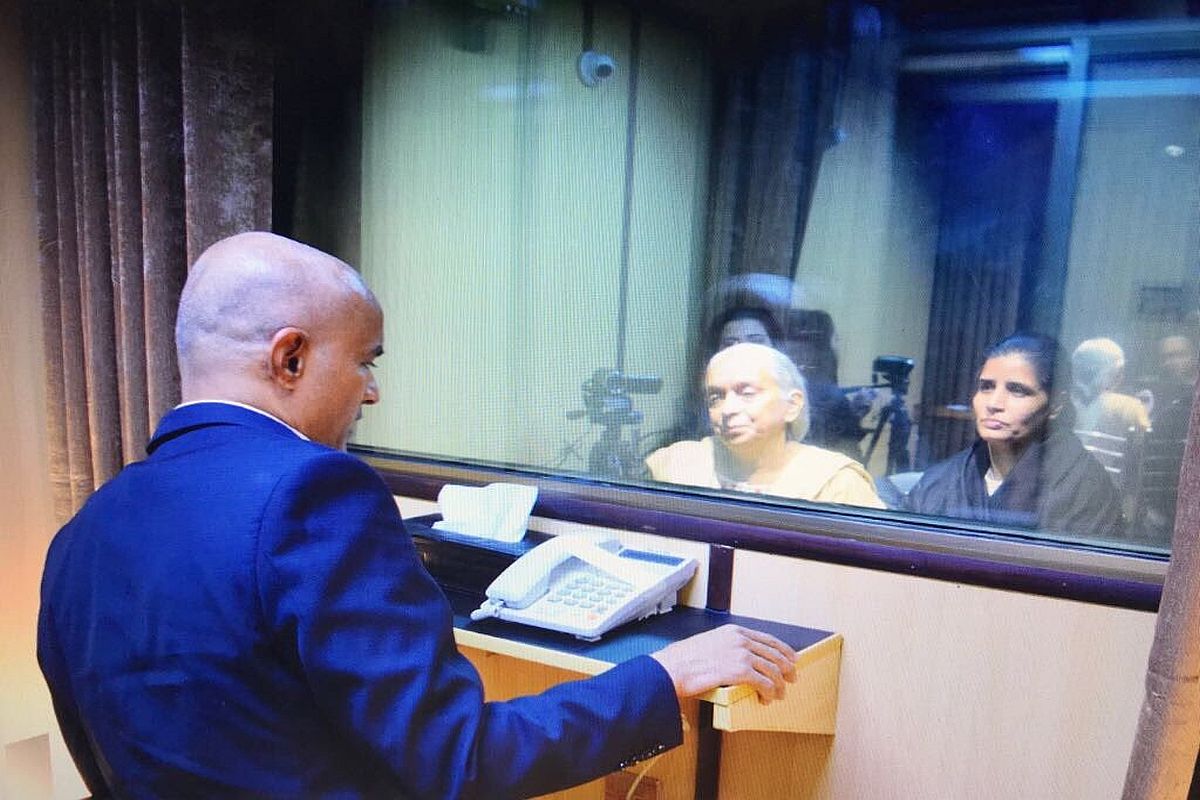Sana Mir and Usain Bolt named ambassadors of ICC T20 WC Qualifier 2024
Former Pakistan skipper Sana Mir and eight-time Olympic gold medallist Usain Bolt have been named as the ambassadors of women’s and men’s ICC T20 World Cup Qualifier 2024.
In a huge victory for India, the ICJ on July 17 ordered Pakistan not to execute Kulbhushan Jadhav and directed ‘effective review and reconsideration’ of his conviction and the sentence awarded to him by a military court.

The mother and wife of former naval officer Kulbhushan Jadhav. (File Photo: IANS)
Day after Pakistan granted consular access to Kulbhushan Jadhav, India’s Deputy High Commissioner to Pakistan, Gaurav Ahluwalia on Monday met the former naval officer sentenced to death in Pakistan over allegations of spying and terrorism.
According to The Express Tribune, the venue of the meeting is not known due to the sensitivity attached to the matter.
Indian Charge d’Affaires Gaurav Ahluwalia had earlier in the day met Pakistan Ministry of Foreign Affairs spokesperson (MoFA) Mohammad Faisal.
Advertisement
Ahead of the meeting, the Ministry of External Affairs had said that it “hopes that Pakistan will ensure right atmosphere so that the meeting is free, fair, meaningful and effective in keeping with the letter and spirit of the ICJ’s orders”.
In a statement, New Delhi said: “India has been seeking consular access to Kulbhushan Jadhav for the last three years. The matter of denial of consular access was taken to the ICJ by India.”
“The court gave a unanimous decision in favour of India. Today, after victory in the ICJ, India will be proceeding for consular access to Jadhav. Indian Charge d’ Affaires, Gaurav Ahluwalia, will be meeting Jadhav,” it further said.
Pakistan Ministry of Foreign Affairs had on Sunday informed that consular access to Jadhav will be provided today in line with the Vienna Convention on consular relations, International Court of Justice (ICJ) judgement and the laws of Pakistan.
The development comes as the International Court of Justice (ICJ) on July 17 ordered Pakistan not to execute Kulbhushan Jadhav and directed “effective review and reconsideration” of his conviction and the sentence awarded to him by a military court.
The world court, while rejecting all objections raised by Pakistan, directed it to grant consular access to Jadhav “without further delay”, while holding that it had “breached” the Vienna Convention in this regard by denying him this right.
The ICJ gave a detailed verdict rejecting all the objections of Pakistan, including one unanimously on the admissibility of the case and also the claims by Islamabad that India had not provided the actual nationality of Jadhav.
The verdict was 15 to one in favour of India – the lone dissenter being from Pakistan.
It ordered, “a continued stay of execution” on Kulbhushan Jadhav, saying it “constitutes an indispensable condition for the effective review and reconsideration of the conviction and sentence” of the accused.
A day after ICJ directed Pakistan to grant consular access to Jadhav, its foreign office said it has informed Jadhav of his rights to consular access under the Vienna Convention.
However, the statement said that Pakistan will grant consular access to Jadhav “according to Pakistani laws”.
But, India had declined the earlier offer of consular access as Pakistan has set some conditions, like insisting that it will have its own person present during the meeting between Indian officials and Jadhav.
Pakistan has claimed that it arrested Jadhav on 3 March 2016 when he attempted to cross over into the country from the Saravan border in Iran in pursuit of targets set by his RAW handlers. New Delhi has rubbished Pakistan’s claim, asserting that the Indian national was abducted by Pakistani agencies from Iran where he was running a business.
Pakistan subsequently conducted a farcical trial of Jadhav in a military court and sentenced him to death. Pakistan Army chief, Gen Qamar Javed Bajwa, had endorsed the death penalty for Jadhav in April 2017. Following this, India approached the ICJ.
Jadhav is not the first Indian national to be held by Pakistan and sentenced to death after being labelled a “spy” and “terrorist”.
Prior to Jadhav, Sarabjit Singh, a farmer from Punjab, was also falsely implicated on charges of terrorism after he inadvertently crossed over to Pakistan on August 30, 1990. He was charged with bombings in Lahore and Faisalabad and sentenced to death by a local court in 1991.
Advertisement